
Skincare products
Skincare products are designed to cleanse, hydrate, and protect the skin, addressing issues such as dryness, aging, and blemishes. They help maintain a healthy, radiant complexion and support overall skin health.
Day cream / Face cream
Choose with advantage products that are classified as dermatological skin care. This means that the products are clinically tested to prevent reactions and are therefore recommended by dermatologists. This applies especially to those with sensitive, dry skin or eczema. Cetaphil is a brand classified as dermatological skin care.
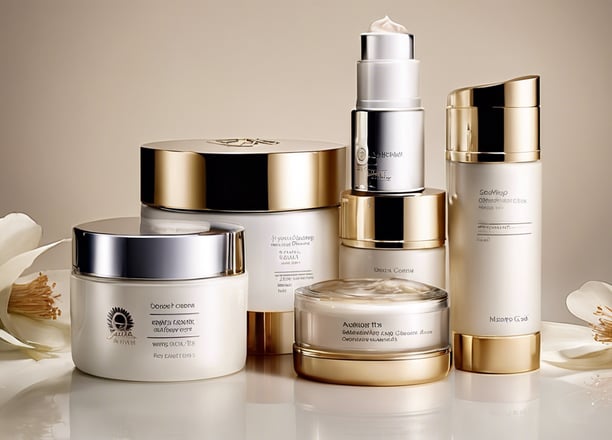

Moisturizing ability
An oily cream provides better hydration as it retains moisture longer, but is more difficult to spread on the skin and should therefore be used in the evening. A lighter day cream is more suitable during the day, as it is quickly absorbed by the skin.
Sun Protection Factor (SPF)
A day cream with SPF provides both hydration and protection against the sun's UV rays to prevent early aging of the skin and skin damage. The SPF level typically ranges from 15 to 50, with higher SPFs providing stronger protection
A good face cream moisturizes and protects the skin against external influences. A face cream consists mostly of fat and water. Some exclusive creams contain active ingredients, such as acids, peptides, vitamins and antioxidants.These help improve skin texture and reduce the appearance of fine lines.
Dermatological skin care recommended by dermatologists
Hyaluronic acid
Found naturally in the skin and retains moisture by binding water up to 1000 times its volume. It is used in many creams to deeply hydrate the skin. The molecular size affects the effect - the smaller the molecule, the better and deeper hydration.
Night cream
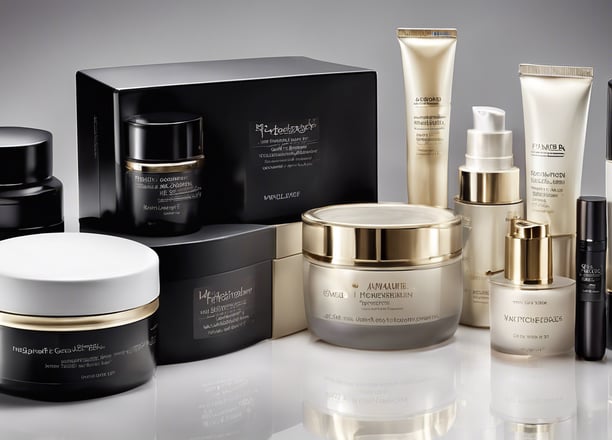

What does night cream do?
Night cream soothes and calms the skin as you sleep, reducing any redness and irritation overnight. By supporting the skin’s natural regenerative processes while you’re sleeping, these creams help to give you a more consistent complexion when you wake up. Night cream also keeps the skin to stay hydrated.
What are the benefits of night cream?
Applying night cream helps your skin to look and feel smoother, firmer, and more toned. The active ingredients of night cream aid the production of collagen, boosting the skin’s elasticity. This in turn lessens the appearance of wrinkles, fine lines, and sagging.
Night cream is different from standard moisturiser in that it is designed to be applied during the evening. Apply just before bed for the best results. While you sleep, your skin regenerates and repairs itself – night creams are specially formulated to help aid this natural process.
What are the active ingredients in night cream?
How to apply night cream
Applying night cream is easy. Simply place a small amount on your chin, nose, forehead, and each cheek. Gently massage the cream into your skin, beginning with an upwards motion and then pushing outwards. Once you’ve massaged the product in, check to make sure you have even coverage and then repeat if necessary.
Anti-Ageing Cream
Understanding the ingredients in anti-aging creams and their potential side effects is important. Retinol creams, for example, can cause irritation and itchiness if used too often or in high concentrations. The same applies to creams containing peptides, which can cause itchy rashes and redness for those with sensitive skin.
It’s best to avoid using more than one anti-aging cream at a time to reduce the risk of side effects or other unwanted reactions. Likewise, patch testing and consulting with your dermatologist before using a new product is always recommended.
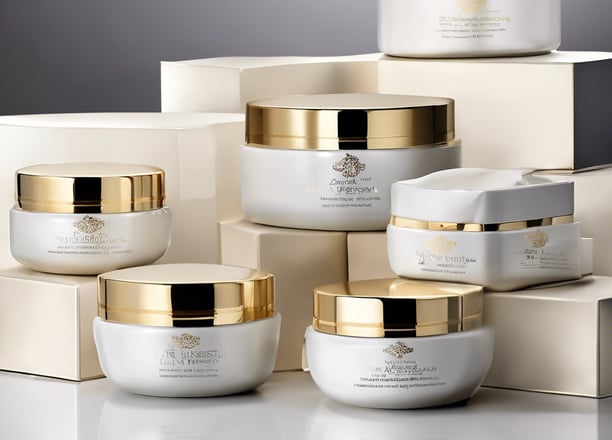

Key Ingredients in Anti-Aging Creams
Even the healthiest of skin will be affected by fine lines, wrinkles, a loss of collagen and even discoloration as the years go by. However, anti-aging creams aim to revitalize and rejuvenate the skin, improving its appearance with such common ingredients as:
How Do Anti-Aging Creams Work
How anti-aging creams works depends on their key ingredients. Most anti-aging products on the market today aim to address such concerns as skin tightening, skin resurfacing and reducing the appearance of fine lines and wrinkles with ingredients that promote healthy hydration, skin cell turnover and collagen production.
As the skin ages, its outer layer (known as the epidermis) thins out as changes in connective tissue reduce the skin’s elasticity. Combine this with a reduction in the body’s natural production of collagen (which gives skin the appearance of fullness) and age-related skin discoloration (including dark spots) — and it’s easy to see how the appearance of the skin changes with age.
Potential Side Effects and Considerations
Peptides – short chains of amino acids that can help build proteins that may be missing in aging skin, such as elastin and collagen.
Antioxidants – substances that help protect the skin’s surface from free radicals, pollution and other common skin irritants.
Sunscreen – protection from the sun’s harmful UVA and UVB rays, which can cause premature aging and discoloration of the skin.
Retinoids – a class of chemicals derived from vitamin A that aims to reduce the appearance of fine lines and wrinkles by boosting collagen production.
Self tanners
Often called "sunless tanning" or "fake tan," most self-tanning products use an active ingredient called DHA (dihydroxyacetone). This compound interacts with the amino acids in the outermost layer of the skin (the stratum corneum), resulting in a temporary, sun-kissed glow. The process is completely safe, non-toxic, and doesn’t require UV exposure or cause permanent skin pigmentation.
Some self-tanners use erythrulose as the active ingredient, which works similarly to DHA but develops color more gradually. Certain products combine both DHA and erythrulose for a longer-lasting tan. However, all self-tanning effects are temporary and typically last up to 10 days, depending on the product.
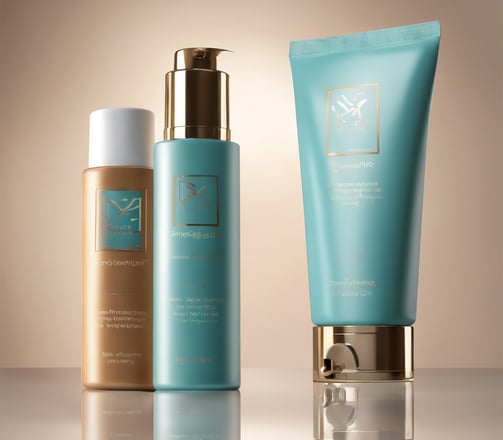

Why use a self-tanning product?
Self-tanners offer a safe, UV-free way to achieve a tanned look, unlike sunbathing or using tanning beds, which expose the skin to harmful ultraviolet (UV) radiation that can lead to skin cancer.
UV light consists of UVA, UVB, and UVC rays. UVB rays cause sunburn by inflaming the skin, while UVA rays penetrate deeper, damaging the underlying tissues and accelerating skin aging. Both types of rays are linked to skin cancer. Fortunately, UVC rays are absorbed by the Earth's atmosphere and don't reach the ground.
Most self-tanning products also contain moisturizing ingredients that keep the skin soft and healthy without causing redness, inflammation, or premature aging, since they do not involve UV exposure. However, it's important to note that not all sunless tanners offer UV protection. Only products labeled with an SPF (sun protection factor) provide sun protection, so check the label if UV defense is needed.
Often called "sunless tanning" or "fake tan," most self-tanning products use an active ingredient called DHA (dihydroxyacetone). This compound interacts with the amino acids in the outermost layer of the skin (the stratum corneum), resulting in a temporary, sun-kissed glow. The process is completely safe, non-toxic, and doesn’t require UV exposure or cause permanent skin pigmentation.
Some self-tanners use erythrulose as the active ingredient, which works similarly to DHA but develops color more gradually. Certain products combine both DHA and erythrulose for a longer-lasting tan. However, all self-tanning effects are temporary and typically last up to 10 days, depending on the product.
New Innovations: Self-Tanning Moisturizers
How do self-tanning products work?
A variety of moisturizers now come with added self-tanning ingredients, offering the benefits of hydration while gradually developing a subtle, temporary tan. These products contain the same active ingredients as traditional self-tanners, like DHA or erythrulose, but in a more diluted form combined with moisturizing agents. Because the tanning ingredient is less concentrated, these moisturizers typically need to be applied regularly to build up color over time.
Concealer
There are several types of concealers available, each suited for different skin types and concerns. Here are the most common ones:
Liquid Concealer: This is the most versatile type of concealer, ideal for most skin types. Liquid concealers are typically buildable, meaning you can layer them for more coverage. They come in a range of finishes, from matte to dewy, and are perfect for covering larger areas like dark circles or redness around the nose. For dry skin, a hydrating liquid concealer works best, while those with oily skin might prefer a matte option.
Cream Concealer: Cream concealers offer medium to full coverage and have a thicker consistency than liquid concealers. They are great for covering blemishes, scars, and dark spots. Cream formulas work well for people with normal to dry skin but may not be ideal for oily skin, as they can sometimes settle into fine lines or appear cakey if not applied correctly.
Stick Concealer: Stick concealers are highly pigmented and offer a lot of coverage in a compact form. They’re easy to apply and convenient for on-the-go touch-ups. However, they tend to have a heavier texture, so they are best suited for covering blemishes and spots rather than large areas like under the eyes, which may appear creased if too much product is applied.
Color-Correcting Concealer: These concealers come in different shades to neutralize specific skin discolorations. Green concealers cancel out redness from acne or rosacea, while peach or orange concealers are great for neutralizing blue or purple-toned under-eye circles. Lavender concealers can help counteract yellow tones or sallowness in the skin.
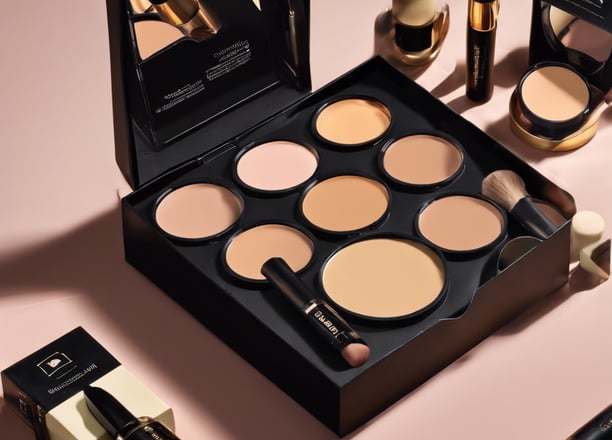

Why Should You Use a Concealer?
Concealer plays a crucial role in achieving a flawless makeup look. Here are some of the key benefits:
Covers Dark Circles: One of the most common uses of concealer is to hide dark under-eye circles, which can be caused by lack of sleep, genetics, or even allergies. A good concealer can help brighten the eye area, making you look more awake and refreshed.
Conceals Blemishes and Acne: Whether you’re dealing with a breakout or a stubborn pimple, concealer can mask those red or inflamed spots, providing a smoother finish. It’s especially helpful when you need quick coverage for acne without caking on foundation.
Concealer is a highly pigmented cosmetic product designed to hide blemishes, discoloration, and other skin imperfections. Its main purpose is to offer more concentrated coverage than foundation, giving you the ability to focus on specific problem areas without applying a full layer of makeup all over your face. Concealers come in a wide range of shades and consistencies, from lightweight liquids to creamier sticks, making them versatile for different skin concerns and types.
Think of concealer as your go-to product when you need to "conceal" or correct areas that foundation alone may not fully cover. Unlike foundation, which is applied evenly across the face to create a uniform base, concealer is typically used more sparingly, applied only where needed for extra coverage or brightening.
What is Concealer?
Types of Concealers
Evens Out Skin Tone: Uneven skin tone caused by hyperpigmentation, redness, or sun spots can be easily evened out with the right concealer. It’s a great way to achieve a more consistent complexion without heavy makeup.
Brightens Key Areas: Concealers aren’t just for covering imperfections. They can also be used to highlight and brighten specific areas of the face, such as the bridge of the nose, the chin, and the under-eye area. This can help create dimension and give your face a more youthful glow.
Defines and Sharpens Makeup: Many makeup enthusiasts use concealer to sharpen the edges of their makeup look, such as cleaning up winged eyeliner or defining brows. It acts almost like an eraser, helping you perfect your makeup without starting over.
Lip Care Products
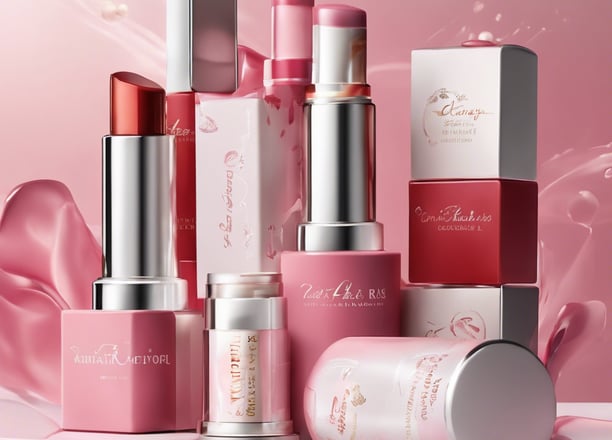

How to Select the Right Lip Care Product
With a wide range of lip care products available on the market, choosing the right one depends on your specific needs. For example, if you struggle with dry lips, look for a hydrating lip balm. If you want a lip color that lasts all day, opt for a long-wearing lipstick. Tinted lip balms and glosses are great options if you want a hint of color while still keeping your lips moisturized.
You may also need to adjust your lip care routine based on the season. In winter, when the air is dry, a richer, more emollient lip balm can help prevent chapped lips. In summer, you might want a lip balm with higher SPF to protect against sun damage.
Key Ingredients to Look for in Lip Care Products
When selecting a lip care product, the ingredients matter. If you have dry lips, look for hydrating ingredients like hyaluronic acid, glycerin, or a peptide collagen booster. These will help to moisturize and plump your lips. If you’re searching for a long-lasting lip color that won’t dry out your lips, opt for products containing beeswax or shea butter, as these provide moisture and protection.
Since the lips are often one of the first areas to show signs of aging, it’s important to care for them early on. Make SPF lip balm part of your daily routine, stay hydrated, and avoid habits like licking your lips or using products with harsh chemicals. Choose your lip care products based on your specific needs, and adjust them with the changing seasons to ensure your lips stay healthy, soft, and protected year-round.
The skin on your lips is unique compared to the rest of your face. It is thinner, more delicate, and therefore more vulnerable to damage from environmental factors such as the sun, wind, and cold weather. To protect your lips, it's essential to use a lip balm with SPF, applying it throughout the day—especially before heading outdoors. Staying hydrated by drinking plenty of water also helps keep your lips moisturized from the inside.
Certain habits can worsen lip dryness, such as licking your lips or picking at them. These behaviors can lead to chapped, irritated lips. Additionally, some lip products, like certain lipsticks, contain harsh chemicals that can dry out your lips, so it’s important to choose lip care products wisely.












